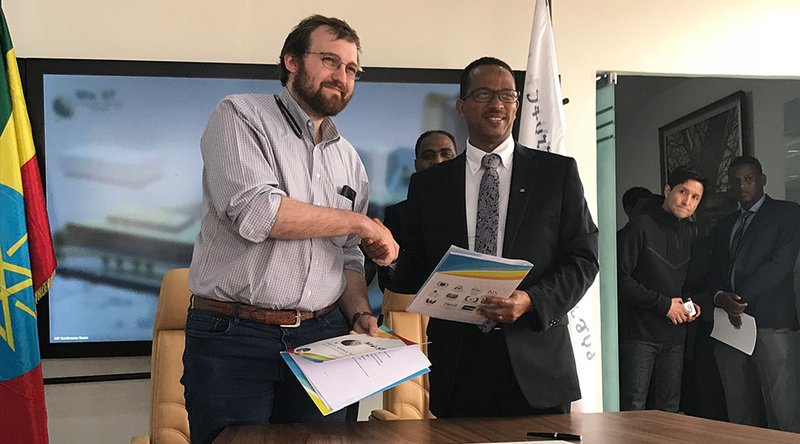“Where Coffee Just Grows”: Connecting Ethiopian Agritech to the Blockchain

Blockchain technology holds great promise in Ethiopia, the largest coffee producer in Africa, but getting a foothold in the country is a challenge due its constraining bureaucracy. One blockchain company is finding inroads by directly collaborating with the government.
IOHK, the company behind the Cardano blockchain, has announced a partnership with the government of Ethiopia to explore how blockchain technology could benefit the country. As part of that, IOHK is offering to train up to 100 Ethiopian software developers in the Haskell programming language.
On Thursday, May 3, 2018, Charles Hoskinson, CEO at IOHK, signed a memorandum of understanding (MOU) with Minister Getahun Mekuria Kuma, representing an official partnership with the Ethiopian Ministry of Science and Technology. The signing took place during a blockchain forum held at the ministry.
“Today is a great day in Ethiopia,” the minister said in speaking to forum attendees. He hinted that the greatest use case for blockchain technology would be tracking the country’s main export. “In Ethiopia, we have been working on the possibility of adopting blockchain for marketing of agricultural products, especially for coffee,” he said.
Government buy-in is crucial to establishing any large scale business or technology in Ethiopia. “If you don’t have it, it is not really going to happen,” John O’Connor, director of African operations at IOHK, told Bitcoin Magazine. “The Ministry and Dr. Getahan have been integral in the work we have done so far.”
While IOHK will provide free Haskell training, the ministry will help IOHK recruit students for the course and aid IOHK in navigating the business environment in the country.
Haskell Training
Cardano, which launched in October 2017, is written in Haskell, a functional programming language. Although Haskell is more challenging to learn than more popular languages, like Java or C++, it is a good match for formal verification, which is a method for ensuring that mission critical code behaves the way it is intended.
Last time IOHK taught a Haskell course, all of the students were male. This time, the tables will turn. The minister wants the first batch of students from Ethiopia to be women to “promote and highlight the importance and participation of women in coding.” The ideal applicant will be a recent graduate from an Ethiopian university with a computer science or related degree, he said.
Hoskinson told Bitcoin Magazine, that the next Haskell course could start as soon as July 2018 and would likely be in IOHK’s Blockchain Research Lab in Edinburgh, Scotland. IOHK, which has previously held Haskell courses in Athens and Barbados, says it plans to hire promising graduates of the course as full-time developers to work with IOHK.
Coffee Connection
Coffee is a crucial export for Ethiopia, home to 100 million people. In fact, coffee is thought to have been first discovered in Ethiopia in the 15th century, later spreading far and wide through the Ottoman empire. Unlike in Brazil and other areas of the world, coffee grows freely in the plateaus of Ethiopia.
“This is the only place in the world where coffee just grows,” said O’Connor, a 27-year-old, who is half Ethiopian and half Irish. “You don’t need to do anything. It is just there. You can literally just forage around and pick it off the ground.” Because of that, little investment has been made in improving production efficiency of coffee, he said.
Ninety-five percent of the coffee grown in Ethiopia comes from small holdings and rural farms, and there are a number of things that can be done to increase coffee yield and improve marketing. One of the biggest challenges, for instance, is proving the origins of coffee. That is where the blockchain steps in.
The idea is that blockchain technology (specifically, a private or permissioned version of the technology, such as Cardano Enterprise) would allow all participants in the supply chain to trace and track coffee as it makes its way from rural farms to wholesale buyers.
Once data is stored on the blockchain, purchasers will know with certainty if the coffee is pure and where it came from, and regulators will be able to gain information about any pesticides used in production, for example.
Blockchain applications also have the potential to make payments and extend loans to farmers. “Coffee drives the economy here and there is so much potential to improve it; hopefully with blockchain products,” O’Connor said.
IOHK is not the first company to contemplate tracing coffee on the blockchain. Starbucks is working on a blockchain-based project to trace coffee with producers in Costa Rica, Colombia and Rwanda, while Colorado-based startup bext360 is using blockchain technology to trace coffee coming from Uganda.
This article originally appeared on Bitcoin Magazine.


